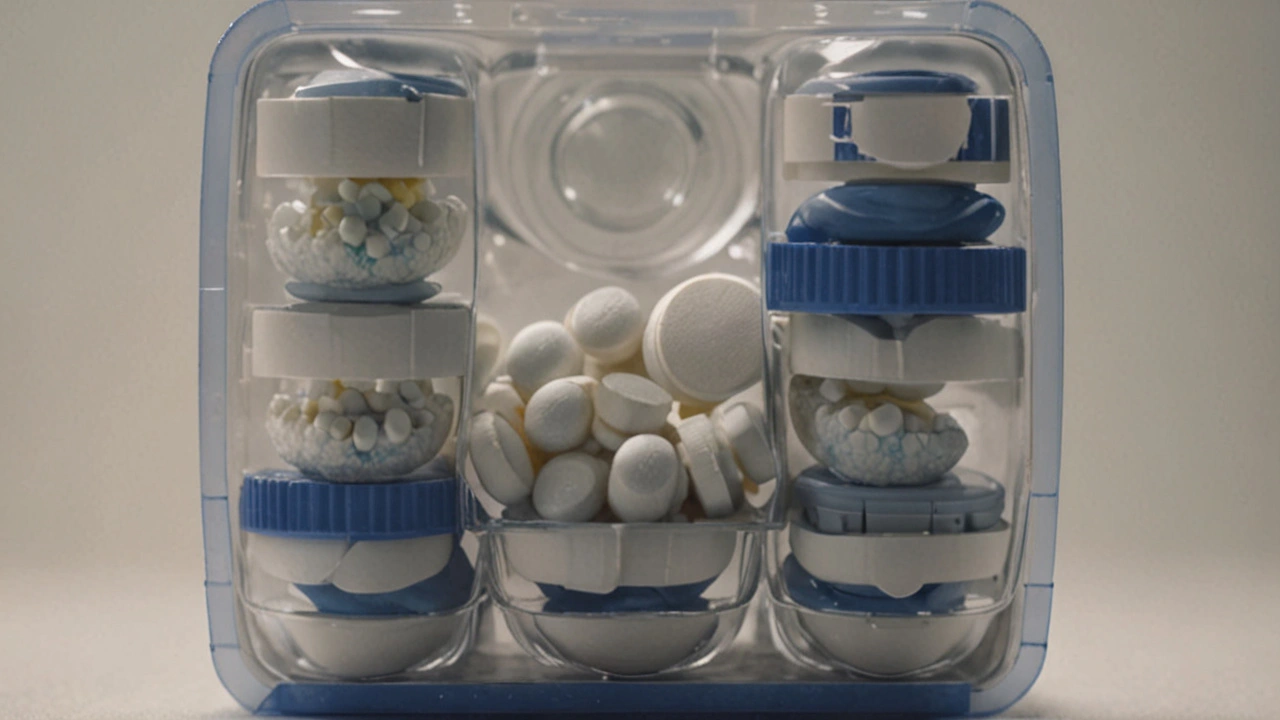Introduction to IBS and Antidepressant Use
Irritable Bowel Syndrome (IBS) is a prevalent condition affecting the gastrointestinal tract, presenting symptoms such as diarrhea, constipation, and abdominal pain. Interestingly, one of the less well-known treatments for IBS includes the use of antidepressants, which are often prescribed even to patients without depression. This might seem counterintuitive at first glance, but research has shown that these medications can significantly alleviate IBS symptoms. Antidepressants like tricyclic antidepressants (TCAs) and selective serotonin reuptake inhibitors (SSRIs) have demonstrated efficacy in managing the chronic discomfort and disruptive gastrointestinal issues associated with IBS.
TCAs in IBS Treatment
Tricyclic antidepressants, or TCAs, are one of the primary classes of antidepressants used to treat IBS. Medications such as amitriptyline, nortriptyline, and imipramine fall under this category. The mechanism through which TCAs function in alleviating IBS symptoms is multifaceted. These medications can influence gastrointestinal (GI) motility, the rate at which food passes through the digestive tract, thereby helping to regulate bowel movements. Additionally, TCAs have an impact on visceral pain—pain that arises from the internal organs—by modulating pain pathways and receptors. By attenuating this pain, TCAs can significantly improve the quality of life for IBS patients, who often experience chronic abdominal discomfort. Furthermore, these medications have a calming effect on the gastrointestinal system, which can further contribute to symptom relief.
The Role of SSRIs
Selective serotonin reuptake inhibitors, or SSRIs, are another class of antidepressants commonly prescribed for IBS management. Drugs like citalopram, fluoxetine, paroxetine, and sertraline belong to this group. SSRIs are typically known for their effectiveness in treating anxiety and depression, conditions that frequently co-occur with IBS. Interestingly, the therapeutic benefits of SSRIs extend beyond just mental health improvements. These medications can also impact gut function by modulating the serotonin levels in the digestive system. Serotonin is a neurotransmitter that plays a crucial role in regulating gut motility and sensitivity, and by influencing its levels, SSRIs can help to balance bowel movements and reduce abdominal pain.
Alleviating IBS-Related Anxiety
Many IBS patients report anxiety as a major component of their condition. This anxiety can exacerbate IBS symptoms, creating a vicious cycle of stress and gastrointestinal discomfort. By addressing the anxiety, SSRIs and TCAs can indirectly contribute to the amelioration of IBS symptoms. The reduction in anxiety can lead to a calmer digestive system, less erratic bowel movements, and a more manageable daily life for patients. Studies indicate that the psychological relief provided by these medications is a significant factor in their overall effectiveness for IBS treatment.
Research and Efficacy
Several studies have highlighted the effectiveness of antidepressants in treating IBS. Clinical trials have shown that these medications not only provide a rapid onset of action but also offer sustained benefits over long periods. Patients often report significant improvements in abdominal pain, bowel regularity, and overall quality of life. Moreover, the risk of tachyphylaxis—a reduced response to a drug following its continuous use—is considered low with these antidepressants, making them a reliable option for long-term IBS management. Researchers believe that the dual action of these drugs, targeting both the gastrointestinal and psychological aspects of IBS, is key to their success.
Choosing the Right Treatment
While antidepressants can be highly effective for many IBS patients, it is crucial to personalize treatment plans. Not every patient will respond the same way to a particular medication, and some may experience side effects that outweigh the benefits. Therefore, healthcare providers must carefully consider individual patient profiles, including medical history, the severity of symptoms, and potential drug interactions, before prescribing these medications. For some patients, starting with a low dose and gradually increasing it under medical supervision can help in minimizing side effects and optimizing therapeutic outcomes.

Conclusion
The use of antidepressants in the management of IBS represents a fascinating intersection between mental health and gastrointestinal medicine. Although these medications are traditionally associated with treating depression and anxiety, their role in alleviating IBS symptoms is well-supported by clinical evidence. By influencing gut motility, reducing visceral pain, and alleviating IBS-related anxiety, antidepressants offer a promising treatment option for patients who have not found relief through other means. As research continues to explore the multifaceted nature of IBS, the integration of antidepressants into treatment protocols may become increasingly refined, ultimately benefiting a broader range of patients.


Sushma Gowda
July 19, 2024 AT 13:58Hey folks, just wanted to add a quick note of encouragement. If you're trying antidepressants for IBS, start low and give your body time to adjust. Many patients notice less cramping after a few weeks, which can be a real morale boost. Remember, staying hydrated and keeping a symptom diary can help your doctor fine‑tune the dosage. Keep your chin up – you’ve got a supportive community behind you.
Angie Wallace
July 19, 2024 AT 14:01Starting low is key. Give the medication a few weeks before judging. Keep track of any changes you feel. You’ll find the right balance with patience.
Doris Montgomery
July 19, 2024 AT 14:06Looks like another hype piece without new data.
Nick Gulliver
July 19, 2024 AT 14:15Honestly, I don’t get why we keep borrowing foreign drugs for our own problems. We have solid American research that can produce home‑grown solutions without relying on antidepressants that were never meant for the gut. It’s time we focus on domestically developed treatments that respect our bodies, not on imported meds that patch symptoms temporarily. The patriotic approach is to invest in gut‑focused therapies that are truly American.
Sadie Viner
July 19, 2024 AT 14:26The interplay between central neurotransmitters and gut motility has been a focal point of gastroenterological research for decades.
Antidepressants, particularly tricyclic agents, exert anticholinergic effects that diminish visceral hypersensitivity.
Clinical guidelines from the American College of Gastroenterology recommend low‑dose amitriptyline as a second‑line therapy for refractory IBS‑D.
Dosage titration typically begins at 10 mg nightly, gradually increasing to a therapeutic window of 25–50 mg depending on patient tolerance.
Concurrently, serotonin reuptake inhibition enhances serotonergic signaling within the enteric nervous system, thereby normalizing peristaltic rhythms.
Selective serotonin reuptake inhibitors such as escitalopram have demonstrated modest improvements in bowel frequency and pain scores in double‑blind trials.
It is crucial to differentiate between the analgesic properties of tricyclics and the pro‑kinetic actions of SSRIs when tailoring treatment.
Side‑effect profiles must be weighed; anticholinergic dry mouth and constipation are common with TCAs, whereas SSRIs may precipitate diarrhea or sexual dysfunction.
Patients with comorbid anxiety disorders often benefit from the dual anxiolytic and gastrointestinal effects of these agents.
A thorough baseline assessment, including Rome IV criteria and psychological screening, informs optimal drug selection.
Monitoring should occur at four‑to‑six‑week intervals to evaluate efficacy and adjust dosing accordingly.
In cases of insufficient response, rotating to an alternative class or incorporating a low‑dose antispasmodic can be advantageous.
Nutritional interventions, such as a low FODMAP diet, synergize with pharmacotherapy and should not be overlooked.
Emerging data on gut microbiota modulation suggest future adjunctive therapies may further enhance outcomes.
Ultimately, an individualized, multimodal approach remains the gold standard for managing this complex functional disorder.
Kristen Moss
July 19, 2024 AT 14:36Yo, that long lecture is cool and all, but honestly, we’ve got enough home‑grown meds that work. Why keep looking overseas when American labs can crank out better stuff? Just saying, the US leads in pharma, so let’s trust our own research.
Rachael Tanner
July 19, 2024 AT 14:46Interesting take! While the American biotech sector is indeed robust, the gut‑brain axis is a global research frontier. Collaborative studies across continents have uncovered nuances in serotonin receptor subtypes that single‑nation labs might miss. Incorporating these insights can refine dosing strategies and minimize adverse effects. It’s a vivid tapestry of science, and pulling threads from multiple sources often yields the most vibrant outcomes.
Debra Laurence-Perras
July 19, 2024 AT 14:56Great points everyone, especially the reminder to keep a symptom diary – it really helps track subtle improvements. Also, remember to stay hydrated and maintain a balanced diet while you’re on medication; these lifestyle tweaks can amplify the benefits. Keep supporting each other, and don’t hesitate to share any successes or challenges you encounter on this journey.